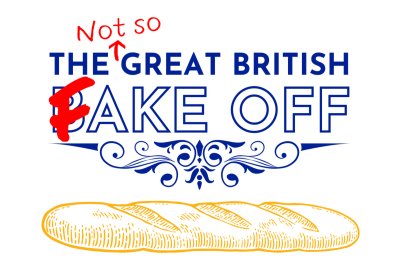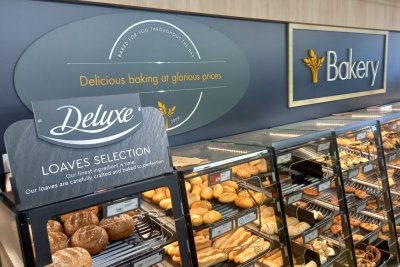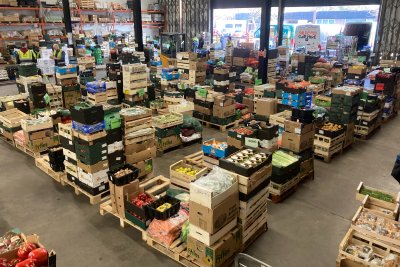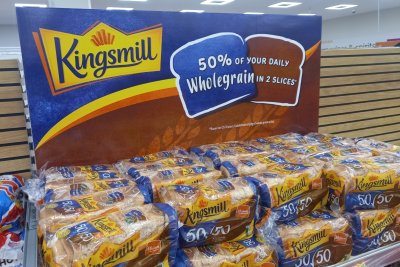Loaf-tanning salon lies?
Real Bread Campaign investigations of 'bakery' secion marketing by the UK's ten largest supermarket chains.

Ever walked into a supermarket and caught the aroma of what seems to be just-made bread? What if I told you that, in many cases, the products were in fact manufactured a long time ago, in a factory far far away?
Shocked? Join the Real Bread Campaign today!
Getting fresh with the truth?
Maybe you’ve followed your nose to a tempting display of unwrapped loaves, perhaps sitting in wicker baskets on wooden shelves, like you might expect to see in a local artisan / craft bakery, accompanied by 'freshly baked in store today' type claims.
Gram for gram, these products cost more than the plastic-wrapped, additive-laden factory stuff in the next aisle, but surely they’re worth the extra? After all, the supermarket is effectively promising you the same as you'd get in an independent bakery but at a cut price, right? There's not a list of additives in sight, so you pick up the tongs and slip that reassuringly-expensive 'bargain' of a non-UPF loaf into a brown paper bag.
The Real Bread Campaign’s (Not so great) British Fake Off investigations reveal that:
- None of the UK’s 10 largest supermarket chains makes everything from scratch in all of its stores.
- Seven of the chains make nothing from scratch in any of their stores.
- Many products are manufactured elsewhere and merely re-baked in-store.
- Some of those products are frozen for transport and storage, with potentially two years between manufacture and re-baking.
- Some products are manufactured outside the UK.
How is a shopper to know which products in a particular store were genuinely made there on that day and which were manufactured elsewhere? Good question…
The Campaign believes that a number of chains are choosing to mislead shoppers by omitting (from labels, signage and web pages) material information about when, where and how prefabricated products were manufactured.
To fill the vacuum left by the omission of these facts, the Campaign feels that companies are displaying products and making claims to spin alternative narratives that state, or strongly imply, products are 'freshly baked in store today'.
The Campaign publishes examples of marketing claims on its Facebook page.
What this is not
To be clear, the Campaign’s complaints aren’t that supermarket chains are making cheap products widely available, it’s about how companies are labelling and marketing them. We work towards everyone being able to choose Real Bread and be able to make better-informed choices.
Dropping, or revising, misleading claims, while presenting honest and transparent information about when, where and how a product was made, will not affect the price or availability of products. Nor will this work have any effect on people who shop mainly / only based on price, availability and personal preference.
In fact, given that supermarkets charge a premium for some bake-off products (compared to other products on their shelves), full labelling and more honest marketing might lead to a reduction in people’s willingness to pay that premium, which could result in prices falling…
Half-baked truths
The truth is that many ‘freshly baked’ products displayed in supermarket ‘in-store bakery’ sections were not baked there, they were merely RE-baked in what the Campaign calls loaf tanning salons. This is a fundamentally different process, with potential costs to the shopper, the environment, and to the local economy.
What are known as ‘bake-off’ products are manufactured at central production units (some of which are overseas), where they are chilled or frozen for transport and storage. The prefabricated products are delivered to stores, where they are loaded into ovens to be re-baked according to a pre-set programme to brown and crisp the crust. Some of these frozen products have a shelf life of up to two years between manufacture and rebaking, though they can be rebaked sooner. According to reports the Campaign has received, some re-baked pre-fabricated products might not even be sold on the day that they are re-baked, perhaps being held over until a day or more later.
The Campaign has not seen any of the supermarket chains in question clearly stating when, where and how particular products are manufactured, which we believe is misleading by omission. Most of the chains then make claims, and merchandise / display products, in ways that imply – or clearly state – that the products were made/baked in-store, which the Campaign believes further breaches a number of food law and other consumer protection regulations.
The complaints
By 4 July 2024, the Campaign had complained to the local authorities with the Primary Authority relationship for trading standards with seven of the UK’s ten largest supermarket chains - listed here in decending order of market share.
Tesco
- Claims include: ‘Expertly baked in store since 1968’, ‘baking fresh from our ovens every day’, ‘freshly baked throughout the day’.
- The truth: Tesco makes some bread from scratch in a small minority of its stores, but also makes these claims in stores that only make some products from scratch, and in stores where nothing is made from scratch. The company sells one or more ‘bakery’ products that were manufactured outside the UK, but does not state this fact on the label or website. The ‘expertly baked in store…’ claim is not representative of the company as a whole, and is made in stores that did not even exist in 1968.
- Complaint submitted to the trading standards department of Hertfordshire County Council on 28 May 2024.
- Status: Unresolved. We emailed Hertfordshire County Council and London Borough of Tower Hamlets on 22 October 2024, 18 November 2024, 5 February 2025 and 3 March 2025, 12 March 2025, 21 March 2025. On 25 March 2025, Herts wrote: 'I will come back to you with a response in due course.’
- Read all updates
Sainsbury’s
- Claims include: ‘Freshly made every day’, ‘freshly baked bread’, 'freshly baked in store every day’
- The truth: Sainsbury’s makes some bread from scratch in some stores, but also makes these claims in stores that only make some products from scratch, and in stores where nothing is made from scratch. We have been unable to establish whether or not any ‘in store bakery’ products are manufactured outside the UK.
- Complaint submitted to the trading standards department of Oxfordshire County Council on 10 June 2024.
- 28 October 2024: Sainsbury’s drops fresh bread claim in some stores. Other elements of our complaint remain unresolved.
- 3 March 2025: We asked Oxfordshire County Council for an update, and advised them that Sainsbury's was still using 'freshly baked' claims in stores that make nothing from scratch.
- Status: Partly resolved.
- Read all updates
Asda
- Claims include: ‘Baked in store’, ‘freshly baked daily’.
- The truth: Asda makes no bread fresh from scratch in any of its stores. Sells one or more ‘bakery’ products that were manufactured outside the UK, but does not state this fact on the label or website.
- Complaint submitted to the trading standards department of West Yorkshire Joint Services (WYJS) on 3 July 2024.
- 21 October 2024: Asda admits 'freshly baked daily' claim is stale. Other elements of our complaint remain unresolved.
- 7 February 2025: WYJS responded 'I responded to your initial email on 22nd October 2024, we will not be taking any further action.' We did not receive that response and escalated the case for review by WYJS.
- Status: Unresolved. Despite Asda's assurance in October 2024, on 14 April we reported to WYJS that Asda was still using the claims ‘Baked in store’ and ‘freshly baked daily’.
- Read all updates
Morrisons
- Claims include: ‘Baked fresh daily’, ‘baked right here’, ‘baked here every day’.
- The truth: Morrisons makes some bread from scratch in some stores, but also makes these claims in stores that only make some products from scratch, and in stores where nothing is made from scratch. We have been unable to establish whether or not any ‘in store bakery’ products are manufactured outside the UK.
- Complaint submitted to the trading standards department of West Yorkshire Joint Services on 12 June 2024.
- 30 July 2024: Morrisons admits products not made in store from scratch. Other elements of our complaint remain unresolved.
- Status: Partly resolved. We emailed West Yorkshire Joint Services and / or Loandon Borpough of Tower Hamlets on 31 July 2024, 19 August 2024, 28 August 2024, 3 September 2024, 25 October 2024 and 11 December 2024 - at which point LBTH responded 'As per my previous emails, this is just to confirm that we will not take the matter further.' We replied that we had not received any such email, and asked them to resend. We followed up on 5 February 2025, 3 March 2025, 12 March 2025, 21 March 2025. On 30 March 2025, we submitted new eveidence to WYJS.
- Read all updates
Lidl
- Claims include: ‘Our fresh in store bakery’, ‘our freshly baked bread favourites’, ‘baked for you throughout the day’.
- The truth: Lidl makes no bread fresh from scratch in any of its stores. We have been unable to establish whether or not any ‘in store bakery’ products are manufactured outside the UK.
- Complaint submitted to the trading standards department of London Borough of Bexley on 31 May 2023, with additional information sent on 29 April 2024.
- 5 November 2024: Lidl deletes freshly baked bread claim. Other elements of our complaint remain unresolved.
- Status: Partly resolved. We emailed LB Bexley and LB Tower Hamlets on 18 November 2024, 5 February 2025, 3 March 2025, 12 March 2025, 21 March 2025.
- Read all updates
Co-op
- Claims include: 'Freshly baked today', ‘freshly prepared in store daily’, ‘from oven to shelf’.
- The truth: Co-op makes no bread fresh from scratch in any of its stores. Sells one or more ‘bakery’ products that were manufactured outside the UK, but does not state this fact on the label or website.
- Complaint submitted to the trading standards department of Manchester City Council on 30 January 2024.
- 23 September 2024: Co-op admitted it was using the claim ‘freshly baked today’ to market ready-made, ‘thaw and serve’ products, and promised to stop making this inaccurate claim. Other elements of our complaint remain unresolved.
- Status: Partly resolved. We followed up with Manchester City Council on 28 November 2024, 5 February 2025, 3 March 2025, 21 March 2025.
- Read all updates
M&S
- Claims include: ‘Oven baked in store today’, ‘baking now’, ‘always sold on the day they are baked’
- The truth: M&S makes no bread fresh from scratch in any of its stores. Sells one or more ‘bakery’ products that were manufactured outside the UK, but does not state this fact on the label or website.
- Complaint submitted to the trading standards department of Birmingham City Council on 25 June 2024.
- Status: Unresolved. We emailed Birmingham City Council on 2 September 2024, 25 October 2024, 18 November 2024, 5 February 2025, 3 March 2025, 12 March 2025, 21 March 2025. On 14 April 2025, we submitted new evidence.
- Read all updates
Waitrose
- Claims include: ‘Baked in store today’. 'Slow-Fermented over two days. Hand-Crafted and naturally delicious. Only the Essentials, No Nasties. 100% Traceable Supply Chain. Suitable for Vegetarians & Vegans. Wildfarmed Life Changing Sourdough is: 1 Super Tasty 2 Naturally Nutritious 3 farmer friendly'. 'Supporting regenerative farming. The future of faring is regenerative. Restoring the soil, saving water and enhancing nature. It's what we do at Waitrose Leckford farm.'
- The truth: Waitrose makes no bread fresh from scratch in any of its stores, and some products are manufactured outsie the UK, but the company does not display these facts at point of sale. Waitrose does not appear to substantiate any of the other marketing claims it uses, or enable shoppers to verify them.
- Complaint submitted to the trading standards department of London Borough of Tower Hamlets on 3 March 2025.
- Status: Unresolved. On 11 March 2025, we asked LB Tower Hamlets to acknowledge receipt of our complaint. Followed up on 21 March 2025.
Aldi and Iceland make no bread or other baked goods fresh from scratch in any of their stores, but the Campaign has not seen either company claiming that they do. If you know different, please email us.
Why this matters
Perhaps some ‘in store bakery’ products are a bit more ‘reassuringly expensive’ than many plastic-wrapped, ultra-processed loaves, but surely it’s worth paying the extra for bread that a baker has just made by round the back, probably without any of those E numbers that you don’t like the sound of? And while you’re avoiding ultra-processed food, you’ll also be supporting skilled jobs in your local community and lower food miles, right?
Shoppers have the right to know if a product has been re-baked and transported from far away, as the process uses around twice as much energy as baking a product once and sold from or near the bakery, and so can have a negative environmental impact. Re-baking also has a negative impact on the quality of a product in that it is likely to stale more quickly than genuinely fresh bread that has only been baked once. This has potential for negative environmental impact as it increases the risk of food waste in the home, at a financial cost to the shopper.
Benefitting from the economy of scale of centralised manufacture; the ability to profit from thousands of high-margin, non-bakery items; and savings of not training and employing skilled bakers in stores enables supermarkets to sell ‘bakery’ products at lower prices than small, independent businesses (that create skilled, meaningful jobs, and help to keep money circulating in local economies) can. The Campaign believes that marketing of the type outlined above is likely to mislead the average shopper and represents unfair competition with small bakeries.
But everyone knows this, so nobody’s being misled
The Campaign has heard a version of this argument more than once. Our response is:
- Isn’t that just saying 'nobody’s being misled because everybody knows they’re being lied to?'
- We can’t, however, agree that everyone knows that behind a promise such as ‘freshly baked in store today’ could lie the truth that those products, sitting in rustic-looking wicker baskets, were in fact manufactured hundreds of miles away and merely re-baked in store. People frequently report to us that they they believe the claims and had understood the claims to mean the bread was freshly made in store on the day they bought it.
The law
Regulation (EC) No 178/2002, states that ‘it is a general principle of food law to provide a basis for consumers to make informed choices in relation to food they consume and to prevent any practices that may mislead the consumer.’ More specifically, Regulation (EU) No 1169/2011 on the provision of food information to consumers requires that ‘food information shall not be misleading, particularly: (a) as to the characteristics of the food and, in particular, as to its nature, identity, properties, composition, quantity, durability, country of origin or place of provenance, method of manufacture or production.’
Regulation (EC) No 178/2002 requires that: ‘The name of the food shall include or be accompanied by particulars as to the physical condition of the food or the specific treatment which it has undergone (for example, powdered, refrozen, freeze-dried, quick-frozen, concentrated, smoked) in all cases where omission of such information could mislead the purchaser.’
Regulation 5 of The Consumer Protection from Unfair Trading Regulations 2008 states that 'A commercial practice is a misleading action if [...] it contains false information and is therefore untruthful [...] or if it or its overall presentation in any way deceives or is likely to deceive the average consumer [...] even if the information is factually correct; and (b) it causes or is likely to cause the average consumer to take a transactional decision he would not have taken otherwise.' Regulation 6 states that: ‘A commercial practice is a misleading omission if [it] omits material information [or] hides material information.’
Article 16 of Regulation (EC) No 178/2002 requires that the: ‘presentation of food or feed, including their shape, appearance or packaging, the packaging materials used, the manner in which they are arranged and the setting in which they are displayed, and the information which is made available about them through whatever medium, shall not mislead consumers.’
The most recent official guidance, Criteria for the use of the terms fresh, pure, natural etc. in food labelling, states: ‘Terms such as “freshly baked”, “baked in store” and “oven fresh” may mislead consumers into believing that they are being offered products that have been freshly produced on site from basic raw materials. Some stores sell bread made from part-baked products that have been packed in an inert atmosphere or frozen off-site then “baked off” at in-store bakeries. Use of terms like “freshly baked”, “baked in store” and “oven fresh” on these products could potentially infringe the general legal provisions…’
The look of loaf
Most of the chains merchandise/display ‘bakery’ products in ways that are markedly different from the painted metal shelves used in the rest of the store. Typically this includes wicker baskets and wooden (or wood-effect) shelving, generally providing tongs for customers to self-select products and slide them into paper bags. A Tesco media release stated that the intention of such merchandising was ‘creating a friendlier artisan feel’ and ‘the kind of atmosphere you’d find in an artisan bakery with wooden shelves.’ The Campaign visited one M&S store that had a little bell beneath a large ‘baking now’ sign, which a staff member could ring to draw attention to, and reinforce, the claim above it.
The Campaign believes that companies presenting re-baked factory products as if freshly made in an artisan bakery breaches this regulation, particularly as these physical and visual cues amplify - and are amplified by – the ‘freshly baked in store today’ type claims.
We see this as pulling the cynical stunt of undercutting the typical price of a loaf hand-crafted at a local bakery (at a much, much smaller scale), while simultaneously being more ‘reassuringly expensive’ than other mass-produced loaves the company sells. Combined with the written claims and merchandising, the pricing helps a company to effectively promise: ‘we’re offering you a premium, artisan bakery product at a bargain price.’
A long time ago in a factory far, far away
Regulation (EU) No 1169/2011 requires that: ‘The indication of the country of origin or of the place of provenance of a food should be provided whenever its absence is likely to mislead consumers as to the true country of origin or place of provenance of that product.’ The regulation goes on to state: ‘In all cases, the indication of country of origin or place of provenance should be provided in a manner which does not deceive the consumer and on the basis of clearly defined criteria which ensure a level playing field for industry and improve consumers’ understanding of the information related to the country of origin or place of provenance of a food.’
By law, four so-called ‘fortificants’ have to be added to all non-wholemeal wheat flour sold in the UK and listed on ingredients lists of products made using it. The Campaign has found a number of bake-off product ingredients lists from which these ‘fortificants’ are absent. They include:
- ‘ASDA Extra Special Apple Raisin & Cinnamon Fruit Loaf’
- ‘Co-op Irresistible Freshly Prepared White Sourdough Baguette’ and ‘Co-op Irresistible Freshly Prepared Kalamata Olive Sourdough Bloomer’
- M&S white baguette
- ‘Tesco White Sourdough Bloomer’
Possible explanations for this are:
- The company has failed to meet the legal labelling requirement to list the ‘fortificants’.
- The product was manufactured from 100% extraction wheat flour (which does not have to be ‘fortified’) but the company omitted the word ‘wholemeal’.
- The product is manufactured in the UK from illegally-sold unfortified non-wholemeal wheat flour.
- The product is legally manufactured overseas, imported and merely re-baked in-store at a later date, and the company has failed to declare these facts on labels or point of sale displays.
If companies are indeed selling products that were manufactured outside the UK, without disclosing their true origins, the company is depriving shoppers of important information that the Campaign believes further contributes to unfair competition with bakeries that make bread fresh from scratch in the UK.
If companies are misleading customers by omission in this way, the Campaign believes that they further breach regulations with claims and merchandising that state and imply an alternative time, place and means of production.
An Honest Crust Act
As well as looking at specific cases, the Real Bread Campaign continues its 15+ years of lobbying successive governments for updated and improved composition, labelling and marketing standards.
Amongst other points, our proposals include:
- Meaningful, legal definitions of 'fresh', 'freshly baked' and related terms, limited to the marketing of products that were made from scratch in the past 12 hours, without the use of artificial preservatives. Not to be used for 'bake-off' products.
- A legal definition of 'bakery' as a place where bread, biscuits, pastries or other baked goods are made from scratch (ie from basic ingredients) on site.
- Displaying full lists of ingredients (plus any and all processing aids and other additives used) being mandatory for every product. This would be printed on wrappers of pre-packed and pre-packed for direct sale (PPDS) products, and on labels or point of sale displays for loose / unwrapped products.
This investigation has generated media coverage including:
- BBC Morning Live (from 9m 40s into the programme)
- The Guardian: Four major UK supermarkets accused of misleading ‘freshly baked’ bread claim
- The Daily Mail: Tesco accused of lying to customers about baking bread fresh in store - when loaves are actually pre-made and defrosted in 'tanning machines'
Please see above for links to the latest on complaints about each of the supermarket chains.
These are updates on our work to ensure that Criteria for the use of the terms fresh, pure, natural etc. in food labelling, and other applicable legislation and guidance is updated and improved.
10 April 2025: Defra advised they have no update.
4 April 2025: We again asked Defra for an update. We added: 'In securing the guidance back in 2008, Sustain worked with (amongst others) The Chartered Institute of Trading Standards. I raised the issue with CTSI, who agree with us that the guidance needs updating and advised that they now have also been in contact with Defra to express their concerns. My contact wrote that Defra is "aware of the value of this document, and we are led to believe there is groundswell to support its updating and re-issuing from both the Trading Standards profession and the food industry."'
4 March 2025: We asked Defra when they would reinstate this important guidance. They replied: 'I recognise the value of the guidance and we are currently considering the future for it. We don’t have a timescale for any decision at this stage whilst we continue to prioritise our workload.'
18 February 2025: Sustain’s CEO, Kath Dalmeny, wrote to Daniel Zeichner, the Secretary of State for Environment, Food and Rural Affairs, asking him to reinstate the guidance, and suggesting a meeting to discuss which of the Real Bread Campaign’s Honest Crust Act proposals the current government might consider taking forward.
30 January 2025: We wrote: 'This is deeply concerning. Is there anything we (the Real Bread Campaign / Sustain) can do to help ensure that this important guidance is reinstated?
We know that ‘Criteria for the use of the terms fresh, pure, natural etc. in food labelling’ has been a key tool in enabling the consistency of enforcement that you mention, including by trading standards officers, environmental health officers (in providing trading standards and business advice functions) and marketing regulators such as Ofcom and the Advertising Standards Authority. Over the years they have used this as the basis for rulings on misleading advertising and other marketing, noting this as the statutory guidance that provides the necessary, specific detail to enable such an authoritative assessment.
Sustain was fully involved in supporting the Food Standards Agency to introduce the original 2008 guidance, with the support of the Trading Standards Institute, Chartered Institute of Environmental Health and Which? the Consumers’ Association. The purpose was to stem a rise in misleading and unfair use of product descriptions and marketing terms that are known to be of high value to consumers. Such marketing had, and still has, the power to undermine the producers of foods and drinks that genuinely are fresh, natural, pure etc.
While legislation requires that labelling and marketing must be accurate, truthful and must not mislead, it does not go into every detail, hence the need for such official guidance. All such bodies and officers benefit from central, official advice to deal with assessment of terms very common in the marketplace, and very often used in misleading ways. Meanwhile, businesses want and benefit from a level playing field.
Nothing has changed that warrants this guidance being dropped without replacement. In fact, FSA and industry research suggests that consumers are ever-more attracted to descriptors, such as those included in the document, due to the implied association with health and wellbeing. Hence, there is an elevated risk of such terms being misappropriated.
As I say, how can Sustain support Defra to reinstate this important 2008 guidance? Looking ahead, we would like to work with Defra, relevant Sustain alliance member organisations and other stakeholders in updating and improving legislation of commonly-used food marketing terms, and official guidance for their use. '
11 December 2024: Defra wrote: 'I recognise your concerns in this area and the work the Real Bread Campaign is doing on the matter, and note that you have been in contact with Trading Standards Officers. ‘Criteria for the use of the terms fresh, pure, natural etc. in food labelling’ is one of the archived documents. Food businesses should contact their local Trading Standards office to discuss the use of these terms on their products. Trading Standards officers have processes in place to get advice and ensure consistency of enforcement. '
2 December 2024: We responded to Defra: 'This issue affects millions of shoppers, as well as thousands of SME bakery workers and owners.
Supermarkets and other retailers making ‘freshly baked in store today’ type claims about products that are, in fact, prefabricated elsewhere and merely re-baked in store, is endemic: trading standards officers are currently investigating our complaints about most of the UK’s 10 largest supermarket chains being engaged in this practice.
Consumer protection officers first turn to statutory instruments covering food labelling / marketing and consumer protection more generally. As there is no specific regulation of these marketing terms, they then look at the long-standing FSA guidance to help them interpret the legislation, for consistency in determining whether or not the claims are misleading and in breach of it.
Is ‘Criteria for the use of the terms fresh, pure, natural etc. in food labelling’ one of the archived documents? If so, what does Defra advise companies and consumer protection agencies / officers to do if they need guidance and clarification on the use of these terms, between now and when you update them? Should they contact you?'
28 November 2024: Defra replied: 'We are aware that several pieces of FSA-branded guidance exist online that have been archived owing to being out of date. They do not necessarily reflect current legislation or consumer understandings. We do not currently have a timeframe for updating this guidance, but are keeping the matter under review.'
26 November 2024: We chased Defra for an update.
24 October 2024: A policy officer at Defra wrote: 'I just wanted to send a quick note to apologise for the time it has taken to respond to you. I am looking into and will get back to you ASAP.'
8 October 2024: We chased Defra for a reply.
3 September 2024: The FSA advised that food labelling no longer falls within their remit. They advised us to email Defra, which we did.
2 September 2024: In respect of the Food Standards Agency's guidance on use of freshness claims, trading standards officers investigating our complaints variously suggested that:
- Most shoppers are now likely to be aware of the ‘bake off’ process and that it is widely used by supermarkets.
- Most shoppers understand and expect that ‘in store bakery’ bread sold in smaller stores is not made in store.
- Most shoppers are likely to expect and accept claims such as ‘freshly baked’ and ‘baked in store’ being used to market bake off products.
- As it was last revised in 2008, the guidance is no longer current/valid.
As we do not agree with any of these suggestions, we asked the FSA to:
- confirm that the 2008 guidance is current and valid
- review and revise the document to ensure that it remains the best guidance available to businesses and consumer protection bodies.
See also
Published Thursday 4 July 2024
Real Bread Campaign: Finding and sharing ways to make bread better for us, our communities and planet.







